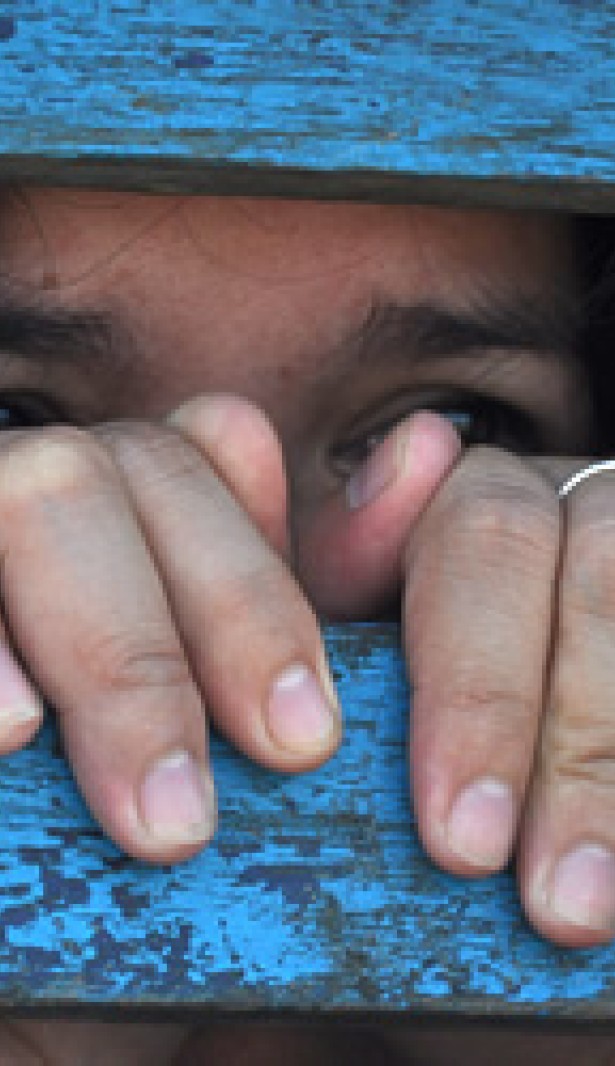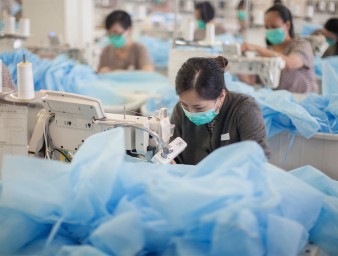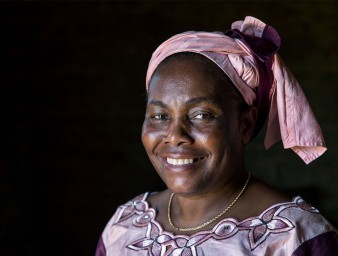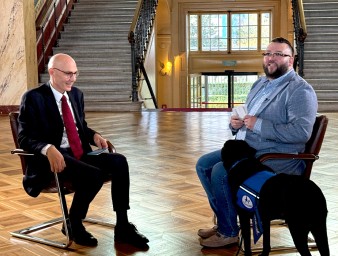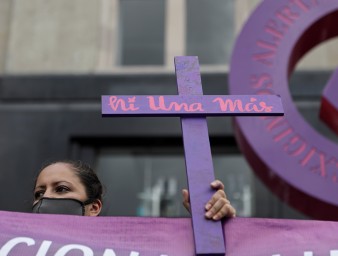Escaping the bonds of human trafficking: Pamela’s Story
28 July 2017
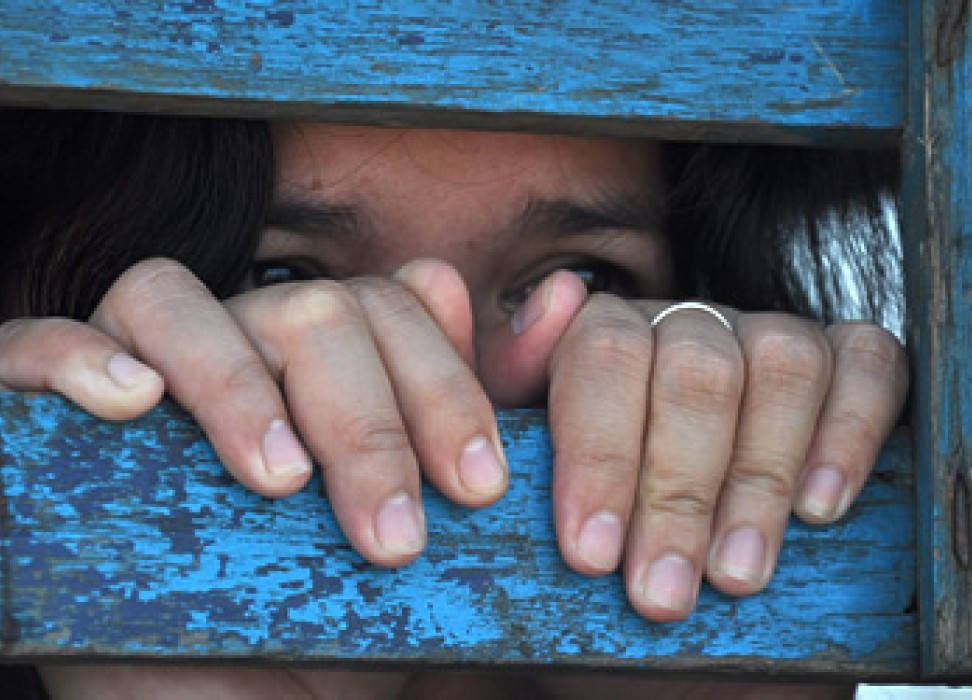
When Pamela accepted an offer from a neighbour’s friend to help her go to Italy, she thought she was accepting a chance for a brighter future. She was 21, and the promise of a job in Europe was an attractive option to the limited prospects in her native Nigeria. She was introduced to a man who told her she must take part in a traditional Nigerian juju ritual that would ensure her protection – as long she did everything he said. The man then handed Pamela over to a Nigerian bus driver, gave her a bus ticket and a telephone number for his contact in Italy.
Pamela travelled across Nigeria and Niger in a bus packed with other women and men, arriving one month later in Libya. There they were brought to a house run by a group of Nigerian and Middle Eastern men who told the group they were forbidden to leave while awaiting the boat journey to Italy. After one month of confinement in the house, where she witnessed beatings, rape and other abuses, Pamela and the other migrants were taken to the shore, where they boarded a boat for Italy
Upon arriving in Sicily, she and the other women on the boat were met by a man who brought them to Naples and to the apartment of a Nigerian woman. She gave the women some clothes and condoms and explained they would have to work as prostitutes on the street, and earn on average 100 Euros per day in order to repay their debt of 35,000 Euros for their journey to Europe. They were to bring their clients to a nearby “connection house” and give their earnings to the woman supervising the house.
Within days of her arrival in Italy, Pamela was forced to work day and night selling sex on the streets, and in between work shifts was kept locked in the apartment. A typical workday began at ten in the morning until nine at night, and after a few hours of rest, they were back on the street for the late night shift, from after midnight until six in the morning.
One week later, after hiding away some money for herself, Pamela left for work one morning and headed instead to the train station and boarded a train to Rome. She asked for assistance from an Italian woman, who contacted the police, who then referred Pamela to a local non-governmental organization called BeFree Social Cooperative, which runs a number of shelters for trafficked women.
“Pamela was extremely traumatized. Like most victims of trafficking, she was in terrible shape. They have seen hell, and they have survived,” said Loretta Bondi, Director of International Projects at BeFree, an organization supported by the UN Voluntary Fund on Contemporary Forms of Slavery.
According to the organization, about 75 percent of trafficking victims in Europe are women, mostly from Nigeria and other parts of western Africa, many are subjected to sexual violence and other human rights abuses throughout their travels, and as many as two-thirds of them are forced into prostitution and are enslaved by their traffickers upon arrival.
“Many migrant women who have been trafficked don’t seek help because they’re not able to escape from their traffickers, or they don’t know how to seek help because of the language and cultural barriers,” said Ms. Bondi.
“Many don’t even know that trafficking is a crime. They know they have suffered violence and abuse. But they don’t know that they are victims of an international crime, and that as victims they have rights to legal recourse.”
Through the support of a grant from the UN Fund, which is managed by the UN Human Rights Office, BeFree is taking cases like Pamela’s to the courts. Since it was founded a decade ago, BeFree has litigated cases in court on behalf of women migrants who have been trafficked. In one landmark judgment in 2012, an Italian court awarded compensation for 17 Nigerian women victims of trafficking against the assets of a trafficking ring of 14 perpetrators.
UN High Commissioner for Human Rights Zeid Ra’ad Al Hussein underscored the importance of continuing to press for multilateral solutions to tackle international networks in the business of trafficking human beings.
“Accountability is essential. Trafficking is a profoundly damaging human rights violation and it is a crime. Its perpetrators must be sought out and held to account,” Mr. Zeid said in a recent multi-stakeholder discussion to review the Global Plan of Action to Combat Trafficking in Persons. “We must continue to advocate the greatest possible emphasis on protection and assistance to victims. Many are migrants – frequently, women and children – who have been deceived or abducted. They are sold, trafficked for sexual exploitation, forced labour, removal of organs and other profoundly abusive forms of exploitation.”
The UN Human Rights Office, through the UN Fund on Contemporary Forms of Slavery, has awarded several million US dollars in project grants to organizations like BeFree that are delivering life-changing services to trafficked individuals who are being subjected to forced prostitution and other forms of modern-day slavery.
At BeFree support centres, women who have survived trafficking receive legal assistance, psychological counselling, language courses and cultural orientation workshops to inform them of their rights and to promote a better understanding of the local customs of their host communities.
“It’s an ongoing struggle to identify those who are suffering from having been trafficked so that we can provide them the assistance they need. Many are not able to escape from their traffickers or are afraid to come forward,” said Ms. Bondi. “But we are always heartened by the immense resilience of those we are able to reach and their determination to take their future into their own hands.”
TAKE ACTION:
Support survivors of trafficking – help them to rebuild their lives. Donate now to the UN Fund on Contemporary Forms of Slavery: http://www.ohchr.org/en/about-us/ohchrs-funding-and-budget/trust-funds/united-nations-voluntary-trust-fund-contemporary-forms-slavery/how-contribute-fund
Established in 1991 by the UN General Assembly, the UN Voluntary Fund on Contemporary Forms of Slavery extends aid to victims whose human rights have been severely violated as a result of modern slavery.
28 July 2017
